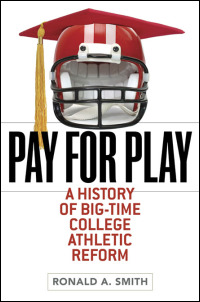 In December we are publishing Ronald A. Smith’s new book Pay for Play: A History of Big-Time College Athletic Reform, which traces attempts at college athletics reform from 1855 through the early twenty-first century while analyzing the different roles played by students, faculty, conferences, university presidents, the NCAA, legislatures, and the Supreme Court. Always a fun topic to consider at the start of the college football season.
In December we are publishing Ronald A. Smith’s new book Pay for Play: A History of Big-Time College Athletic Reform, which traces attempts at college athletics reform from 1855 through the early twenty-first century while analyzing the different roles played by students, faculty, conferences, university presidents, the NCAA, legislatures, and the Supreme Court. Always a fun topic to consider at the start of the college football season.
Today’s Inside Higher Ed profiles the new University of Nebraska Press book Scoreboard, Baby: A Story of College Football, Crime, and Complicity, which examines the 2000 University of Washington football team. The authors “found that football players on Washington’s team for the 2000 season were under investigation in connection with a variety of crimes, including domestic violence, rape, robbery, and shooting a drug dealer.”
I enjoyed the piece but I got caught up by one statement made by co-author Ken Armstrong:
Scoreboard, Baby follows these and other players through the season, showing readers the kinds of classes some student-athletes took to remain academically eligible (Sexuality in Scandinavia, Paper Science, Dinosaurs) …
Sexuality in Scandinavia and Dinosaurs may look odd out of context but aren’t they both University of Washington offerings that other students—non-athletes—take? If so, why is it inappropriate for a football player to take these courses? I was a Finance major in college and took a class titled Religious Rebellions and Messianic Movements in History. Necessary for a Finance degree? No. Provided credits necessary to graduate? Yes.
If these are courses designed specifically—and only—for athletes, then I think there is an even bigger story here. If not, should the athletes be held to a different academic standard than the rest of the UW student population?
